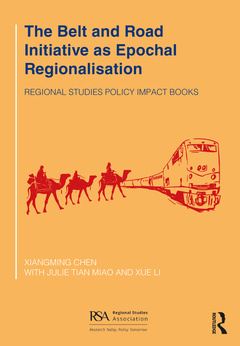Description
The Belt and Road Initiative as Epochal Regionalisation
Regional Studies Policy Impact Books Series
Authors: Chen Xiangming, Miao Julie Tian, Li Xue
Language: English
Subjects for The Belt and Road Initiative as Epochal Regionalisation:
Keywords
BRI Country; Belt and Road Initiative; BRI Project; Globalization; Epochal Regionalisation; Urbanization; China’s BRI; Cross-border corridors; DSR; Regional dimensions; ADR; Asia; Vang Vieng; Africa; Djibouti Port; Europe; Djibouti City; China–Europe freight train; China’s Total FDI; China's urbanisation; China Laos Border; China's BRI; Yangtze River; Globalisation; Iron Silk Road; Connective Infrastructure; Laotian Government; Global Innovation Leader; Corona Virus; Private Chinese Companies; Local Development; China State Construction Engineering Corporation; CPEC; Indirect Operation; Ethiopian Workers; World’s Largest Container Ships; Northern Laos
45.15 €
In Print (Delivery period: 14 days).
Add to cart· 17.4x24.8 cm · Paperback
Description
/li>Contents
/li>Biography
/li>
The Belt and Road Initiative (BRI), launched by China in 2013, carries and projects powerful regional dimensions and transformations, with short- and long-term global, national and local consequences. The BRI?s regional significance lies in its designation and creation of several cross-border corridors that originate from inside China and extend out into its neighbouring countries, and those farther afield in Asia, Africa and Europe. Through driving and facilitating new trade and infrastructure connections along and beyond these corridors, the BRI has begun to reshape the master processes of globalisation, urbanisation and development by affecting the economic, social and spatial fortunes of many countries and cities.
This book serves two purposes. First, through a new framework and three case studies, it examines the BRI?s impacts on globalisation, urbanisation and development via the China-Europe Freight Train, the paired construction of a new city and railway across the China-Laos borderland and the port-park-city development corridor between Djibouti and Ethiopia. Second, the comparative analysis and evidence guide the book to advance policy recommendations for targeted stakeholders that can potentially turn the BRI into a global public good with greater benefits and fewer risks.
1. The BRI and regionalisation 2. The BRI and globalisation 3. The BRI and urbanisation 4. The BRI and development 5. A synthesis and looking forward
Xiangming Chen served as the founding Dean and Director of the Center for Urban and Global Studies at Trinity College in Connecticut from 2007 to 2019. He is Paul E. Raether Distinguished Professor of Global Urban Studies and Sociology at Trinity College and a guest professor at Fudan University, Shanghai. He has published extensively on urbanization and globalization with a focus on China and Asia and conducted policy research for the World Bank, the Asian Development Bank, OECD and UNCTAD.
With
Julie Tian Miao is a Senior Lecturer in Property and Economic Development in the University of Melbourne and also an honorary Research Fellow in Shanghai Jiaotong and Henan Universities, China. Dr Miao studied economic geography and planning at the University College London. Her research has been developed along two innovative fields on the ‘intrapreneurial state’ and at the interface between housing, labor and the knowledge economy. She has published widely on these themes and conducted policy research for the Chinese Ministry of Land and Resources Management, Scottish Cities Alliance in the UK and the Victorian Government in Australia.
Xue Li is an Associate Professor in the Department of Sociology at Fudan University. Her research interests are in political sociology, social inequality and stratification, and global analysis. Her current projects involve social consequences of the fiscal reform, and how economic globalization reshapes social inequality in China. Her research work has been published in American Sociological Review, Social Sciences of China, and other peer-reviewed journals.




